- Clone
- 3A2A20 (See other available formats)
- Regulatory Status
- RUO
- Other Names
- POU domain class 5, transcription factor 1 (POU5F1), OCT4, OCT3
- Isotype
- Mouse IgG2b, κ
- Ave. Rating
- Submit a Review
- Product Citations
- publications
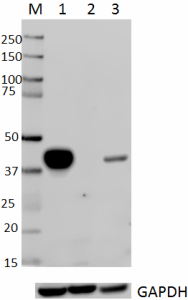
-

Total lysates (15 µg protein) from NTERA2 (lane 1), HeLa (lane 2) and NF-1 (lane 3) cells were resolved by electrophoresis (4-12% Bis-Tris gel), transferred to nitrocellulose, and probed with 1:1000 diluted (0.5 µg/mL) Purified anti-Oct4(Oct3) Antibody, clone 3A2A20 (upper), or 1:2000 diluted anti-GAPDH Antibody (lower). Proteins were visualized by chemiluminescence detection using a 1:3000 diluted goat anti-mouse-IgG secondary antibody conjugated to HRP for the anti-Oct4 Antibody or 1:3000 diluted Donkey anti-Rabbit-IgG secondary antibody conjugated to HRP for anti-GAPDH Antibody. Lane M: Molecular weight ladder. -

NTERA-2 cells were fixed with 4% paraformaldehyde (PFA) for 10 minutes, permeabilized with 0.5% Triton X-100 for 5 minutes, and blocked with 5% FBS for 30 minutes. Then the cells were intracellularly stained with 2.5 µg/mL anti-Oct4 (Oct3) (3A2A20) and followed by DyLight™ 594 goat anti-mouse IgG (red) for 1 hour at room temperature. Actin filaments were labeled with Alexa Fluor® 488 Phalloidin (green). Nuclei were counterstained with DAPI (blue). The image was captured with a 40X objective. -
Chromatin Immunoprecipitations (ChIP) were performed with cross-linked chromatin samples from 4 X 106 NCCIT cells with either A) 1:50 dilution of Go-ChIP-Grade™ Purified anti-Oct4 (Oct3) Antibody (clone 3A2A20, Cat. No. 653713) or B) equal amount of Purified Mouse IgG2b, κ isotype control antibody (clone MPC-11, Cat. No. 400301) by using Go-ChIP-Grade™ Protein G Enzymatic Kit (Cat. No. 699904). The enriched DNA was purified and quantified by real-time qPCR using primers targeting human SOX2 gene region or α-Satellite repeats. The amount of immunoprecipitated DNA in each sample is represented as signal relative to total amount of input chromatin. -
Chromatin Immunoprecipitations (ChIP) were performed with cross-linked chromatin samples from 4 X 106 NCCIT cells with either A) 1:50 dilution of Go-ChIP-Grade™ Purified anti-Oct4 (Oct3) Antibody (clone 3A2A20, Cat. No. 653713) or B) equal amount of Purified Mouse IgG2b, κ isotype control antibody (clone MPC-11, Cat. No. 400301) by using Go-ChIP-Grade™ Protein G Enzymatic Kit (Cat. No. 699904). The enriched DNA was purified and quantified by real-time qPCR using primers targeting human OCT4 gene region or α-Satellite repeats. The amount of immunoprecipitated DNA in each sample is represented as signal relative to total amount of input chromatin.
| Cat # | Size | Price | Save |
|---|---|---|---|
| 653701 | 25 µg | ¥34,980 | |
| 653702 | 100 µg | ¥69,740 |
Oct4 (Octamer binding transcription factor 4) is an important marker of the undifferentiated state and central regulator of pluripotency in ES cells. When embryonic stem cells are triggered to differentiate, Oct4 is downregulated, thus providing a model for the early events linked to somatic differentiation in the developing embryo. Oct4 is a nuclear protein, with a predicted molecular weight of 39 kD.
Product DetailsProduct Details
- Verified Reactivity
- Human, Mouse
- Antibody Type
- Monoclonal
- Host Species
- Mouse
- Immunogen
- Partial human Oct4 recombinant protein (1-141aa).
- Formulation
-
This antibody is provided in phosphate-buffered solution, pH 7.2, containing 0.09% sodium azide.
Previous lots of this product may have been formulated with 0.1% or 0.05% NaN3 instead of 0.09% NaN3. For further information please contact BioLegend Technical Support or Customer Service. - Concentration
- 0.5 mg/ml
- Storage & Handling
- Upon receipt, store undiluted between 2°C and 8°C.
- Application
-
WB - Quality tested
ICC, ChIP - Verified - Recommended Usage
-
Each lot of this antibody is quality control tested by Western blotting. Western blotting, suggested working dilution(s): Use 0.5 µg/ml antibody dilution buffer for each mini-gel. For immunocytochemistry, a concentration of 2.5 µg/ml is recommended. For ChIP applications, the suggested use of this reagent is 1:50 to 1:100 by volume. It is recommended that the reagent be titrated for optimal performance for each application.
- Product Citations
-
- RRID
-
AB_2561766 (BioLegend Cat. No. 653701)
AB_2561766 (BioLegend Cat. No. 653702)
Antigen Details
- Structure
- Belongs to the POU transcription factor family, predicted molecular weight of 39 kD
- Distribution
-
Nuclear protein, expressed in undifferentiated embryonal carcinoma (EC) cells, embryonic stem (ES) cells and embryonic germ (EG) cells
- Function
- Transcription factor that binds to the octamer motif (5'-ATTTGCAT-3'). Oct4 is a prime candidate for an early developmental control gene. It also is an important marker of the undifferentiated state and central regulator of pluripotency in ES cells.
- Interaction
- SOX2, SOX8, SOX10, androgen receptor, and ETS2
- Biology Area
- Cell Biology, Immunology, Stem Cells, Transcription Factors
- Antigen References
-
1. Niwa H, et al. 2000. Nature Genet. 24:372.
2. Wernig M, et al. 2007. Nature 448:318.
3. Pesce M, et al. 2001. Stem Cells 19:271. - Gene ID
- 5460 View all products for this Gene ID
- UniProt
- View information about Oct4 on UniProt.org
Related FAQs
Other Formats
View All Oct4 Reagents Request Custom Conjugation| Description | Clone | Applications |
|---|---|---|
| Purified anti-Oct4 (Oct3) | 3A2A20 | WB,ICC,ChIP |
| PE anti-Oct4 (Oct3) | 3A2A20 | ICFC |
| Alexa Fluor® 488 anti-Oct4 (Oct3) | 3A2A20 | ICFC |
| Brilliant Violet 421™ anti-Oct4 (Oct3) | 3A2A20 | ICC,ICFC |
| Alexa Fluor® 647 anti-Oct4 (Oct3) | 3A2A20 | ICC,ICFC |
Customers Also Purchased

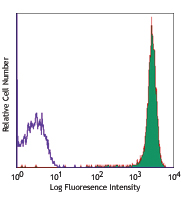
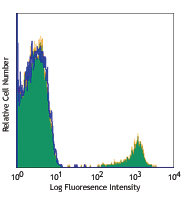
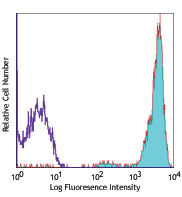
Compare Data Across All Formats
This data display is provided for general comparisons between formats.
Your actual data may vary due to variations in samples, target cells, instruments and their settings, staining conditions, and other factors.
If you need assistance with selecting the best format contact our expert technical support team.
-
Purified anti-Oct4 (Oct3)
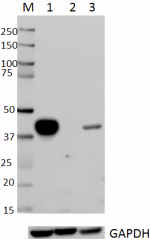
Total lysates (15 µg protein) from NTERA2 (lane 1), HeLa (la... 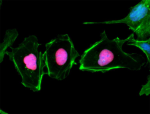
NTERA-2 cells were fixed with 4% paraformaldehyde (PFA) for ... Chromatin Immunoprecipitations (ChIP) were performed with cr... Chromatin Immunoprecipitations (ChIP) were performed with cr... -
PE anti-Oct4 (Oct3)
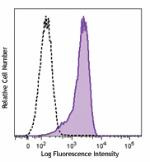
Human teratocarcinoma cell line, NCCIT, was treated with FOX... -
Alexa Fluor® 488 anti-Oct4 (Oct3)
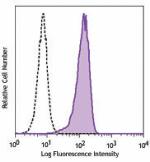
Human teratocarcinoma cell line NCCIT cells were fixed and p... -
Brilliant Violet 421™ anti-Oct4 (Oct3)
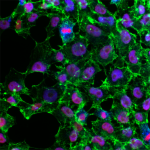
NCCIT pluripotent embryonal carcinoma cells were fixed with ... 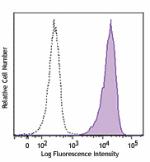
Human teratocarcinoma cell line NCCIT cells were fixed and p... -
Alexa Fluor® 647 anti-Oct4 (Oct3)
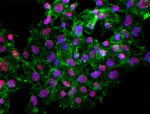
NCCIT pluripotent embryonal carcinoma cells were fixed with ... 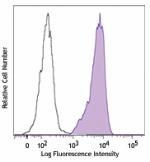
Human teratocarcinoma cell line NCCIT cells were fixed and p...











Follow Us